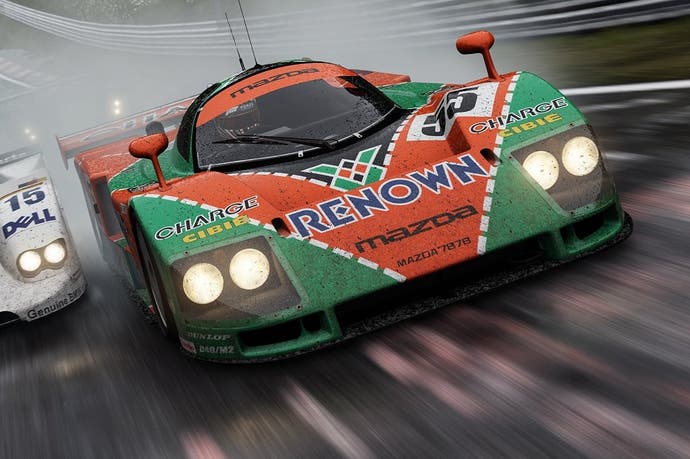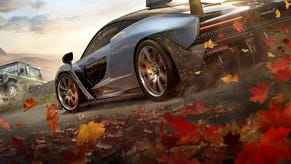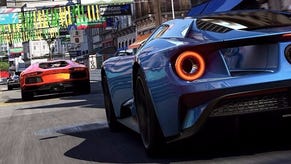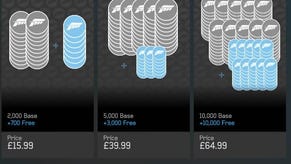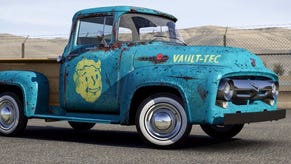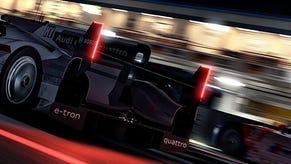Forza Motorsport 6 review
Once more with fuelling.
Forza Motorsport 6 is introduced by a toe-curling live action video which, in its anodyne, expensive pomposity, might as well be a banking advertisement. As you play, new features are explained to you in the soporific tones of a supermarket checkout kiosk. It is saturated with commercial tie-ins: for its cover star, the 2017 Ford GT supercar, which itself is really just a fantastical advertisement for more humble Fords, and for Top Gear (although, amusingly, Jeremy Clarkson's voice is nowhere to be heard). It's one of the most corporate video games ever made.
And yet: Forza Motorsport 6 is also a generous, handsome, impressive and beautifully engineered package. It has hundreds of cars and dozens of tracks, of course, and a commanding feature list accumulated over 10 years and six games which includes the best online service in racing games, and to which it makes meaningful new additions. It's also a game that can serve up 24-car races at a flawless 60 frames per second, online or off, rain or shine, without sacrificing its stirring good looks. And none of this is a contradiction with the above paragraph, because that kind of heft is exactly what corporate wealth and experience - in the case, the corporate wealth and experience belonging to the software giant Microsoft - buys you.
The important thing for followers of the series to note is that Forza 6 is also a big improvement on its misguided predecessor. Developer Turn 10 made three serious errors with Forza 5 (or perhaps one, since they were all likely by-products of the decision to make it an Xbox One launch game). One was to submit to an internal fad at Microsoft for aggressively priced micro-transactions. Another was to settle for a limited content roster - of tracks especially - that felt like a backward step for the series. And the third was to ship with a broken tyre simulation that pushed the series' traditionally tail-happy handling over into outright twitchiness, which made for a frustrating and nervy drive.
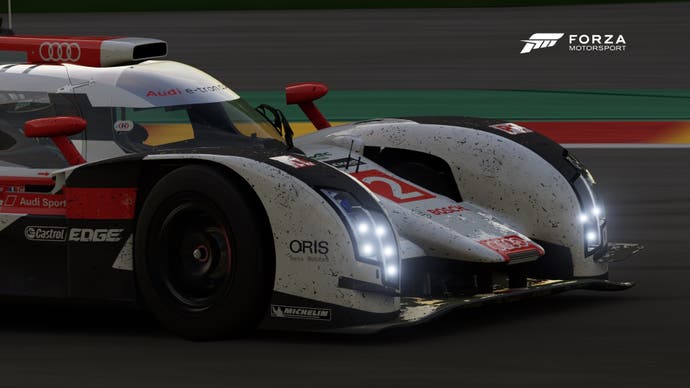
All have been fixed. Micro-transactions are gone without a trace (and cars bought in add-on packs can be added to your garage without having to spend credits, too). The car and track lists are beyond reproach. The former has been bolstered by all sorts of entertaining exotica from last year's open-world spin-off Forza Horizon 2, as well as a thoughtful selection of licensed racing cars from a wide range of disciplines. New tracks, meanwhile, include a colourful showpiece on the streets of Rio de Janeiro, a few favourites like Brands Hatch and Monza making their Forza debuts, and a rare chance to acquaint yourself with a couple of absolutely terrific US racing circuits, Watkins Glen and Lime Rock Park.
The handling has been tamed, too. As Martin pointed out in his initial impressions, car handling models can be a very subjective matter of taste, no matter how detailed the developers' claims of scientifically objective simulation - so perhaps the most informative thing you can say about Forza 6's handling is that it is well tuned and firmly in the series' tradition. Forza has always tended towards an enjoyably controllable rear-wheel drift, backed up by a strong sense of weight and speed and a well considered suite of assists. Its strengths are accessibility and excitement, its weaknesses are lightweight aerodynamics and muted variation between different kinds of vehicle. As a simulation, Forza 6 is not a match for the recent Project Cars - but it handles so much better on a pad that, for most players, that will be a moot point.
There's much else a prestige showroom project like Forza 6 can offer that the likes Project Cars or Assetto Corsa cannot. The sheer wealth of licensing is one thing. Another is the lavishly appointed and lengthy career mode, with its economy of XP and credits and its acquisitive journey through the game's garage, from humblest road car to most rarefied racer. This is a tradition of the genre, established by Gran Turismo, that Turn 10 has always struggled to find a satisfying structure for - at its worst, offering sheer grind without the variation or curation to make it interesting.
This year's model is called 'Stories of Motorsport' and it takes some good cues from its sister title Horizon 2, notably the way cars are divided into carefully curated thematic groups - track toys, classic muscle, executive heavyweights - rather than simple divisions of power, drivetrain or country of origin. But it's a strictly linear progression up through the ranks that feels rather constraining; even if you can afford a Lotus F1 car, or win one in a prize spin when you level up (another of many judicious lifts from Horizon), you won't be able to use it for another 20 hours. The events themselves are rote racing which never succeed in raising the stakes the way Project Cars' heart-in-mouth race weekends do, but at least the wealth of content in this game prevents them feeling too repetitive - and the 'drivatar' AI, while still sketchy, is somewhat improved.
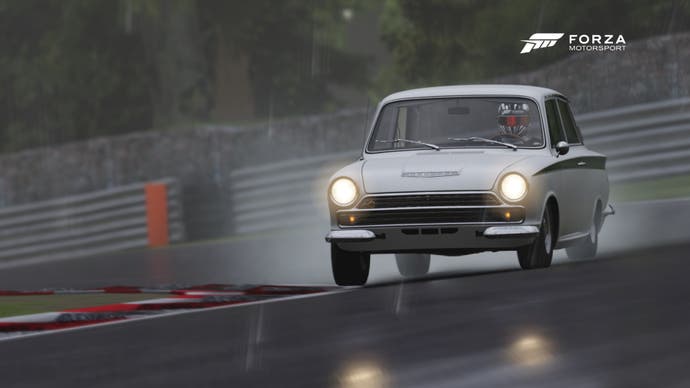
Fortunately, this mode is joined by a wonderful sideshow suite called Showcases, which is easily the most creative and exciting single-player content Turn 10 has produced to date. Here you can sample a wide range of hardware, in exciting in scenarios, without having to buy it first, and fully half the events are unlocked at the start. There are classic moments in the history of motorsport, modern racing formulae, demanding autocross time trials and tight factory-spec races. Forza has historically been designed as a utilitarian framework for racing, so it's a surprise and a delight to see some strongly flavoured game design like Showcases this time around.
But it's still framework that Turn 10 excels at - that Microsoft excels at - and that is why Forza Motorsport 6's online modes leave almost all its competition for dust. For my money, the only other online racing experiences that can hold a candle to it are Mario Kart 8 and iRacing, which exist so far to either side of the spectrum as to barely be considered competition at all.
It is a strange anachronism of the racing game scene that many titles, even Gran Turismo, expect players to manually browse lobby lists if they want to race online at all. Forza is perhaps the only game in the genre that offers features taken for granted in other competitive fields like shooting, fighting or strategy games: sound matchmaking, automated playlists, streamlined leaderboards and a changing calendar of events. It has also fostered a unique and creative community around trading paint jobs and tunes for its cars; there's no other game in which you can buy a stock Alfa Romeo 155 saloon and then download the work of other players to turn it into its monstrous 90s touring car alter ego, complete with accurate livery.
Forza 6 takes another big step forward with the addition of League racing, a ladder system for ranked play that filters players into five ability brackets. Each bracket hosts multiple themed leagues, with sessions open at varying times of day, and car classes and difficulty settings that suit players' ability. A league generally lasts a week and, when it closes, you receive a credits payout according to where you placed out of the hundreds or thousands of players that took part.
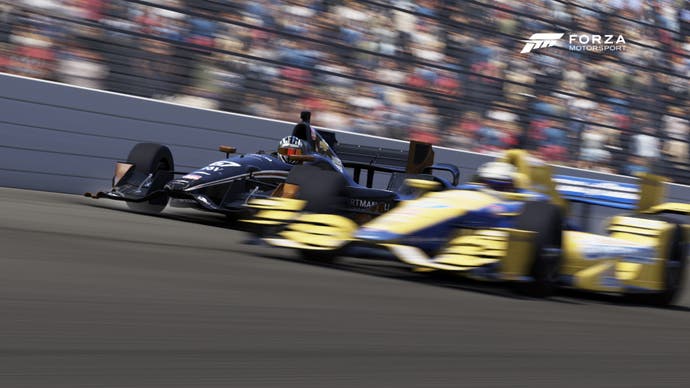
League racing could use some further tweaks and a bit more transparency about how it works, but it's off to a great start already. Whilst its scoring system initially seems to encourage grinding, you'll find that a just a few good results will catapult you up the rankings, especially if you beat players who are ranked higher than you. Just competing for position in a single League over the course of a week is exciting stuff, and the following week you'll have a new race series to look forward to, as well as the prospect of promotion to a higher bracket.
Turn 10 has said that the impetus behind Leagues is to provide an online environment where you'll always find players of similar ability, and it already looks like a success on that score. A further promise that it will filter players according to temperament, so clean racers and those who "enjoy contact" will be kept apart, will be harder to fulfil - especially since the Forza community displays a continuing and aggravating inability to get round turn one of any given race without a massive pile-up.
But this is just what I mean by the value of a corporate approach to making games. It's Microsoft - in the guise of Turn 10, which was founded and is based on its Redmond campus - whose unglamorous focus on engineering solutions to user problems is dragging online racing games into the 2010s, where they can finally join the likes of StarCraft and Call of Duty in providing a competitive environment that's fair, serious, seamless and fun. Whilst I agree with Martin that some aspects of Forza are starting to look a little dog-eared - notably the trudge of its main career mode - it has other qualities that remain streets ahead of all its rivals.
Forza Motorsport 6 is too square to be cool, too rational to capture the romance of motorsport, too formulaic to capture its gritty, high-stakes drama. But it's also too good to ignore.
